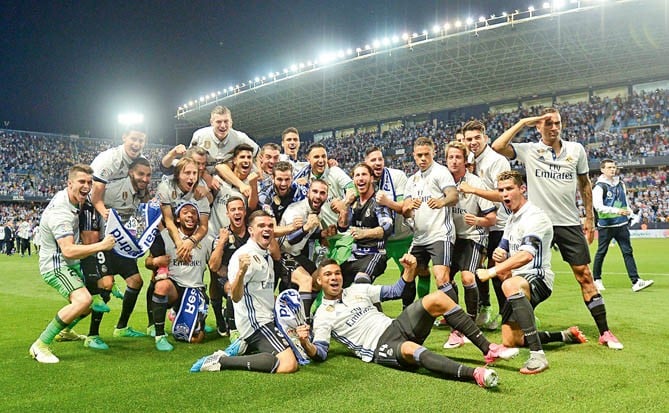
Having already won the league, the Club World Cup and the Super Cup already this season, Madrid are looking to make history by winning the Champions League final against Juventus next Sunday

When Zinedine Zidane was appointed Real Madrid manager on January 4 last year, the task before him was simple. It is the assignment given to everyone who is hired to manage the most illustrious football club in the world. Win everything.
The timing of Zidane’s appointment made sense, since the team was going nowhere under Rafael Benitez in La Liga and had booked its customary place in the knockout stages of the Champions League. Hence, Zidane - a longtime fan’s favourite as a player, and someone involved with the club in multiple capacities since November 2010 - was given the luxury of not having to deliver domestically in half a season, with Champions League glory the primary target given the gap in the league with Barcelona.
Zidane’s task of "winning everything" when he joined 18 months ago, was further complicated by the fact that Real’s archenemy had been the one fulfilling this particular assignment in large part for the previous eight years. Since the 2007-08 season Madrid had only won one league (2012) and one Champions League (2014) trophy.
Zidane ended his first (half a) season at Real with the club’s 11th Champions League trophy, and only one point behind Barcelona in the league. They also followed that up with the Club World Cup late last year.
But when the 2016/17 season began, Madrid had one main objective: La Liga. While the 10th and 11th UCL crowns had been won in the previous three seasons, the Madrid side wouldn’t be the best in Spain if it wouldn’t win the league.
With that in mind Zidane set about playing his cards in the current season to ensure that his side outlasts the usual suspects Barcelona and Atletico Madrid. This was founded upon exemplary squad rotation, where two different Real Madrid sides would play different competitions amidst demands of the Champions League, La Liga and at the turn of the year the Club World Cup as well.
Amidst the wide gamut of things that Zidane had to manage was an aging Ronaldo. The Ballon D’Or winner has played 2,544 minutes this season, compared to 3,183 last year - 11 games less. But he was the one putting the ball at the back of the net when Real needed him the most in both the league and the Champions League.
Impeccable squad rotation has meant that Lucas Vazquez and Marco Asensio have risen to prominence. The rise of Isco in recent months has been evident, and has filled much of the void created by Gareth Bale’s injuries-enforced layoffs. Similarly, Alvaro Morata’s 15 league goals highlight how the entire pool of players was perfectly utilised by Zidane, with 20 players playing 1,000 or more league minutes for the Spanish Champions.
While Ronaldo will deservedly muster most of the glory, and might bag another Ballon D’Or, Madrid’s title winners boast an array of worthy champions. The most prominent mentions among these should go to Marcelo and Casemiro. The former’s attacking input has been visible, with Marcelo being the top assist-getter in the five major European Leagues. Casemiro’s steel in the midfield has allowed Luka Modric and Toni Kroos to pull the strings in the final third of the pitch.
Kroos himself was exemplary in keeping Real Madrid ticking all season. The Modric-Kroos partnership kept possession like no other midfield duo and exhibited attacking passing coming from the very top drawer, which also meant that the German was second only to Luis Suarez in assists this season.
With Real struggling to get out of second gear in the first couple of months of the season, the game that made a statement of intent for Zidane’s side was the 3-0 away win at Atletico on November 19. Two weeks later Madrid salvaged a point at the Nou Camp with Sergio Ramos stepping up to the plate to score a trademark header late in stoppage time. The point that Real won in that 1-1 draw, and the two that Barcelona lost, eventually proved to be the differential in the final standings, despite Madrid losing at home to Barca later in the season.
Having already won the league, the Club World Cup and the Super Cup already this season, Madrid are looking to make history by winning the Champions League final against Juventus next Sunday. It would be the first time a side would successfully defend the Champions League and would be a first La Liga and European Cup double for Madrid since 1959. To put things into context in terms of what they are, and have been, chasing for the past decade or so: Barcelona have four of those doubles in the last 11 seasons alone - five overall if you count the 1992 season when they won the European Cup for the first time.
What happens on Sunday remains to be seen, with Juve chasing history of their own as well, but with the league win and the Champions League final, Real have established themselves as the best team in Spain. More often than not, in recent years, doing so has been good enough to establish the team as the best in the world as well.